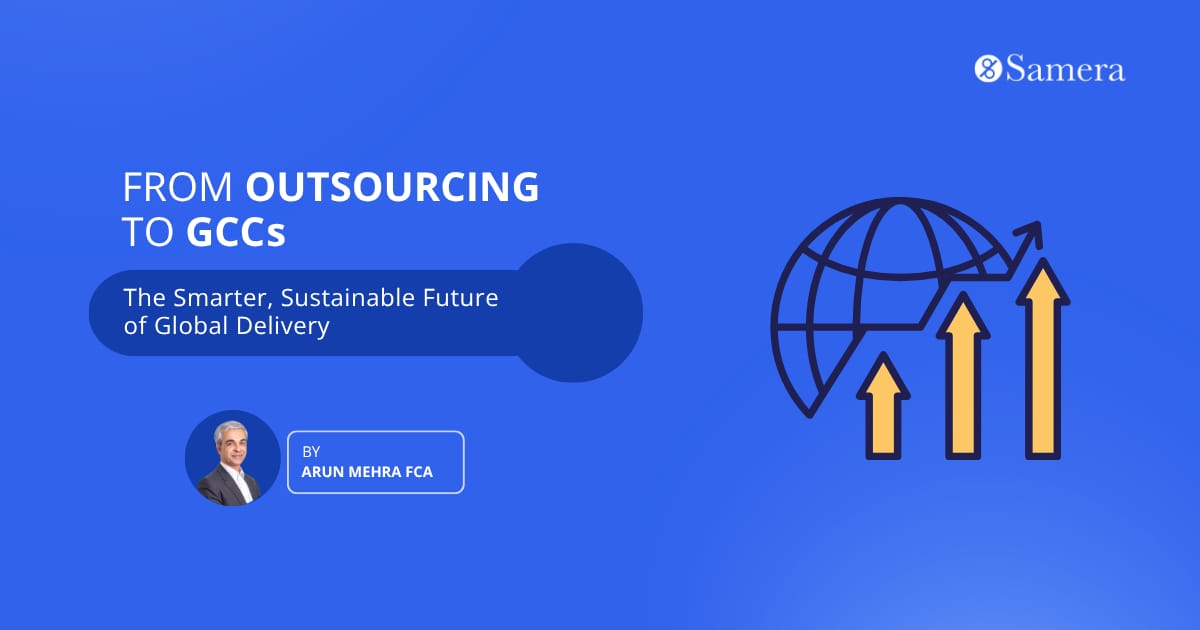Hi {{firstname|everyone}},
For years, many UK firms have treated India like a testing ground, running small “pilot” outsourcing projects to see what works.
Problem is, pilots rarely scale. They end up as half-hearted experiments that neither deliver true cost efficiency nor build sustainable capability.
What I have seen is that firms start with good intentions, hire a few offshore staff through a vendor, and expect results overnight. When quality or communication falters, confidence hits rock bottom. And all that leads to offshoring not working.
The problem is not India. It is the model.
What’s working now isn’t outsourcing. It’s partnership built through Global Capability Centres (GCCs) that operate as genuine extensions of your UK team, not external vendors chasing the next invoice.
So what does this new model look like in practice, and why are firms shifting towards it? Let’s break it down.
From Cost-Cutting to Capability Building
The old outsourcing model was predominantly about saving money. The new one is about building scale and resilience.
In a GCC, the focus shifts from temporary cost relief to sustainable capability. The aim is to create a structured offshore team that mirrors your firm’s skill base and values.
This means hiring qualified professionals who can handle real client work, not just administrative overflow. It means investing in proper onboarding, system integration, and ongoing training so that your offshore operation becomes a direct contributor to your firm’s growth.
And you know what? UK firms that have made this shift are seeing measurable results.
In fact, over 130 UK-based Global Capability Centres (GCCs) in India generate around USD 6.5 billion annually and employ more than 200,000 professionals.
For firms on the ground this means turnaround times improve because work continues overnight. Senior UK staff gain capacity to focus on advisory and client-facing roles. Most importantly, firms are no longer dependent on a few overworked people at the top.
With a GCC model, firms are building a scalable delivery engine that supports long-term growth.
Quality Without Compromise
Many outsourcing attempts fail because firms lose control over quality.
Tasks are sent abroad without clear supervision. Different vendors manage work their own way. The output may be cheap, but it is inconsistent.
A GCC solves this through ownership and alignment.
According to PwC India research, GCCs aligned fully with their headquarters can achieve an extra 3-4 percentage points improvement in value-creation growth (in addition to an 11-12% CAGR expected between FY25-29).
Under this model, the offshore team reports into your firm’s leadership. They use your systems and follow your workflow. Review processes are built into the structure, ensuring the same level of quality you would expect from your UK office.
In practical terms, this means setting clear KPIs, implementing periodic quality checks, and having local team leads who understand both UK accounting standards and Indian delivery dynamics.
When you build this level of oversight, quality no longer becomes a variable. It becomes a given.
Culture and Collaboration: The Real Differentiator
The biggest shift happens when firms stop viewing India as an external branch and start treating it as part of their team. That requires building cultural alignment, not just hiring people.
As of 2023, GCCs of more than 40% of global businesses are now led by dedicated GBS heads, up from just 21 percent in 2021. Nearly 80% also sit under the CFO’s leadership, showing how these centres have evolved from back-office functions into strategic parts of the business.
Simple steps make a big difference. Include your Indian team in weekly meetings. Let them attend internal training sessions. Have UK managers visit India during key milestones. The last one is so important!

Here’s our Head of Marketing Chris and I with our India team taking a dive into Indian mythology!
The most successful GCCs are those where people feel equally invested in outcomes. UK and India teams operate with shared accountability, shared recognition, and shared ambition.
That is when a firm truly becomes global, not just geographically but operationally.
How We Do It at Samera
At Samera Global, we follow this partnership-first model in everything we do.
We help UK accounting and dental firms establish dedicated Global Capability Centres that mirror their brand, their quality standards, and their growth goals. The result is a setup that delivers consistent output, faster turnaround, and scalable capability without the cost or chaos of trial-and-error outsourcing.
If your firm is ready to move beyond pilots and start building something sustainable, now is the time to act.
Discover how we help build Global Capability Centres:
Cheers,
Arun
Tech moves fast, but you're still playing catch-up?
That's exactly why 100K+ engineers working at Google, Meta, and Apple read The Code twice a week.
Here's what you get:
Curated tech news that shapes your career - Filtered from thousands of sources so you know what's coming 6 months early.
Practical resources you can use immediately - Real tutorials and tools that solve actual engineering problems.
Research papers and insights decoded - We break down complex tech so you understand what matters.
All delivered twice a week in just 2 short emails.



